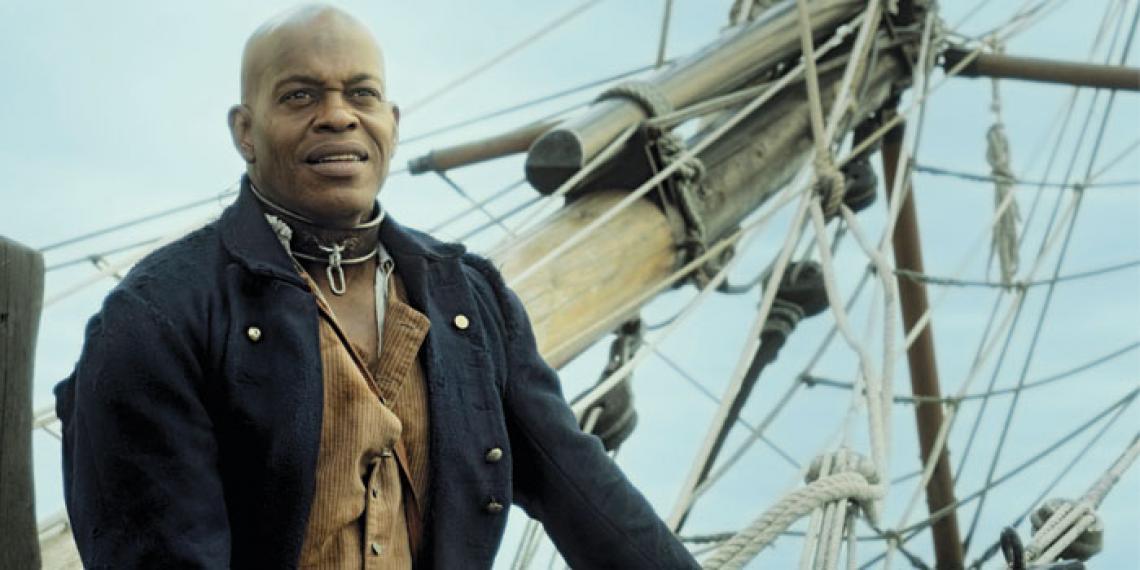You are here
Still fighting for freedom

Sadly, human slavery is not some abhorrent aberration from the pages of history. It is a modern-day travesty that sees hundreds of thousands of men, women and children suffering daily around the world … today.
‘I am a man—am I not your brother?’ In 1748, on board a slave trader ship, a desperately sick slave poses this thought-provoking question to John Newton. This is a voyage that will see Newton’s life changed forever as his eyes are opened to the brutality of the slave trade.
This scene, as played out in the recently released film Freedom, is a poignant reminder for us today that our lives are inextricably bound with innumerable others, known and unknown, who produce the myriad of goods we buy and who provide many of the services we enjoy—all at bargain prices. The film, which follows and moves between the lives of two men separated by 100 years yet bound together by their search for freedom, portrays the best and the worst of human nature.
We watch with horror as the slave Samuel Woodward and his family desperately try to escape from the Monroe Plantation in Virginia, USA. They are relentlessly pursued by Plimpton, a notorious slave hunter. Samuel is forced to make the difficult, but very human choice between revenge or freedom.
One hundred years earlier, on the ship captained by John Newton, Samuel’s great-grandfather is on his way to America, his survival tied to the fate of Captain Newton. While Samuel’s ancestor’s fate as an American slave is sealed, Newton’s own change of direction creates a legacy that will eventually inspire Samuel, along with those of us confronted by the reality of human slavery today.
We witness with admiration the selfless bravery of those who formed the underground railway to help countless desperate enslaved men, women and children like Samuel and his family find freedom. And we are reminded that amid the suffering today are other quiet liberators willing to risk all for their brothers and sisters. From beginning to end, Freedom exposes the mix of emotions experienced by Samuel’s fleeing family as they swing between despair and hope, and eventually turn to forgiveness and faith. This powerful film finishes with the invitation, ‘Will you join the freedom journey?’
The quest for freedom for all people is not weakened by time or distance, neither is it dimmed by the cruelty or indifference of some. Rather, this quest continues to be strengthened by the unwavering determination of ordinary women and men—young and not so young—who recognise that we are all made in God’s image and that, bound together by the love of Christ, we must choose to continue to stand up and challenge all forms of inhumanity.
The 28th of September is a day set aside by The Salvation Army around the world to pray for those who have been trafficked. Trafficking in people for profit does not recognise or respect borders, and today no country is immune to this crime in its many forms. Yet, while awareness campaigns and anti-trafficking programmes increase across the world, there is no lessening of the number of people trafficked each year. Even less effective is detection of victims and bringing to justice the perpetrators.
So, what can be done at a local as well as an international level to help bring about effective transformation?
At the recent Wellington Just Action conference, we were challenged to shift from being consumers to contributors. Moving from an ingrained pattern of consumerism to one of bringing life-giving change to others may require a 180-degree shift in our attitudes, beginning with the recognition that we are part of a global trafficking chain. From here, we need to move outwards, gathering evidence and accurate data to direct our actions. What we don’t know, we cannot begin to put right.
We are well overdue addressing the real issues surrounding human trafficking, which are complex and not easily solved. Together, let’s commit to put aside false and outdated Hollywood images of some heroic white male rescuer and a frail female victim, and work collaboratively with civil society to bring about real change. The clock is ticking—will you join the freedom journey?
Chris Frazer is a social justice advocate with The Salvation Army Social Policy and Parliamentary Unit—www.salvationarmy.org.nz/socialpolicy. If you’d like to do more to tackle human trafficking, please contact Chris, p: (04) 384 5649, e: chris_frazer@nzf.salvationarmy.org
Salvation Army Establishes International Task Force
The Salvation Army has announced it will establish an International Anti-Human Trafficking Task Force, chaired by the Director of its International Social Justice Commission. Chris Frazer, a long-time advocate for the cause of preventing human trafficking with The Salvation Army in New Zealand, has been asked to attend a fact-finding and strategy meeting at International Headquarters in early October that will assist in the establishment of this task force.
#jointhefreedomjourney
Freedom, starring Oscar winner Cuba Gooding Jr. as Samuel Woodward, is coming to New Zealand Cinemas in October. The Salvation Army is planning special screenings in Auckland, Wellington and Christchurch. More details to come.
by Chris Frazer (c) 'War Cry' magazine, 20 September 2014, pp11.
You can read 'War Cry' at your nearest Salvation Army church or centre, or subscribe through Salvationist Resources.